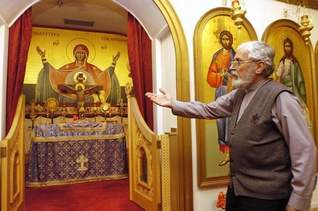Father clarifies Greek Orthodox beliefs

OCEAN CITY — When the Rev. Vasilios Penteridis talks about the Greek Orthodox religion, it is with sacredness, with pride, with a certainty about life and death and suffering so rare in today’s superficial world.
Day by day, earthly trials and pain can be endured because they are not eternal, he believes.
“Suffering is temporal, so in suffering there is joy. The thing of value is true eternity, divine bliss, divine happiness. The more we are close to God, the more happy we are. We are without despair and without fear. This is the Christian faith,” he said.
Members of the Orthodox faith are taught “to live according to his will and glorify his name,” he said, referring to God.
“Love even your enemies. Forgive. Help those in need,” he said from behind his desk one recent afternoon, the desk that, technically, isn’t his any more, since he is retired after serving nine years at St. George Greek Orthodox Church in Ocean City.
The interim pastor is Father Andreas Markopoulos.
But Penteridis was kind enough to return to his pastoral role to explain the religion.
“Study the Bible. Study like the saints. Live as the church teaches you to live,” he advised.
A slight man with a full head of gray hair and beard, he speaks with a thick Greek accent in a lively manner, sharing historical facts, making Biblical references, punctuating each with a smile and invitation to ask questions because he is eager to share his faith.
The word “orthodox,” explained Nick Nicholson, president of the church’s parish council, means “right believing” or “truth.”
The church, on 90th Street and Coastal Highway, has a membership of about 260 families. Anyone is welcome to attend Divine Liturgy, as the service is called, at 10 a.m. Sunday mornings. It lasts about one hour.
Split from Roman Catholic
The Orthodox church, Nicholson explained, split from the Roman Catholic church in 1054 for political, cultural and religious reasons.
While both churches are Christian, and believe Jesus was the son of God, born of the Virgin Mary, came to earth as savior and will return, there are distinctions between the Catholic and Orthodox religions.
In the Orthodox religion, the Holy Spirit has a central role and is one of the persons of the trinity, who proceeds from the father, not from the father and the son. The Holy Spirit places God’s love in human hearts and is considered a gift from Christ.
Orthodox priests are referred to as “father.” They may marry, but only if they marry before they are ordained.
Only 2-3 percent of Orthodox priests are celibate, Penteridis said, and he is among them.
“It was by choice,” he said.
He wanted to fully dedicate his life to the church.
The Orthodox observe the seven holy sacraments, which include baptism. In the Orthodox faith, it is done by full immersion when a baby is about 1 year old. After a child is baptized he or she may begin taking communion.
There are no separate services for first communion or confirmation, because they are bestowed at baptism.
Concerning the sacrament of marriage, the Orthodox belief is that the goal of marriage is for the two spouses to help each other grow spiritually, not for procreation.
“If children come, thank God. If they don’t come, thank God again,” Penteridis said.
The sacrament of the Holy Eucharist, or communion, is the center of worship, he said. Those who receive it “partake mystically of Christ’s body and blood, and through it receive life and strength,” he said.
Round loaves of white bread are baked by women of the church and marked with a seal. Pieces of the bread are placed in wine, and communion is administered by the priest, who places it in each mouth using the same spoon for the entire congregation.
Afterward, the priest consumes the remaining wine and bread.
No changes are made during flu season, Penteridis said, because the belief is no virus or germ can be greater or stronger than the creator.
At a church he formerly attended, Nicholson said, a man who was HIV positive took communion with the congregation, off the same spoon, “and there was never an incident.”
Bread baked with yeast is used for communion, not unleavened bread, because, “yeast is life,” Penteridis said.
Icons are venerated instead of statues. The icons are paintings of saints, angels, Jesus and the Virgin Mary, large and colorful in the sanctuary, and reverence is directed at the person they represent, Nicholson explained.
The Virgin Mary has supreme grace and is highly honored. A large painting of the Virgin Mary is behind the altar at St. George, with the words, “Wider than the heavens” in Greek. Women may not be ordained as priests, be on the altar or administer communion.
That is based on the belief that, at Jesus’ Last Supper, Jesus ate with an assembly of men. No women were present.
“Not even the Holy Virgin was there. Is there any woman more holy than the Holy Virgin? They were all men. We don’t change anything. What we were given, we kept. Whenever humans try to correct God, there are problems,” the pastor said.
“My fulfillment in the Greek Orthodox religion is to be united with my God,” he continued.
“God is the source and owner of all good things. Love. Life. The devil has nothing.
“Being connected with the source of happiness brings you happiness. With humility, you love everybody. You help everybody,” he said. “That is how God blesses you.”

